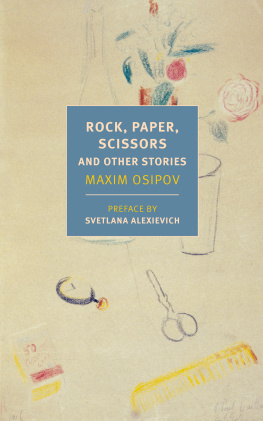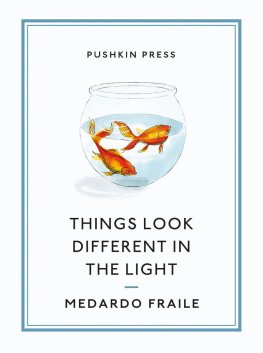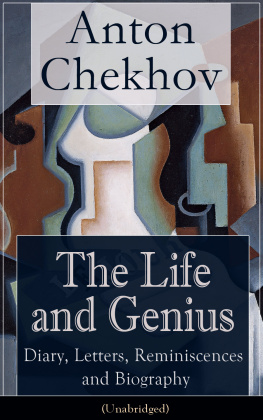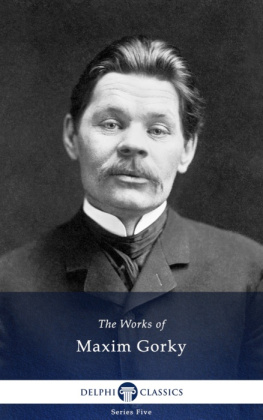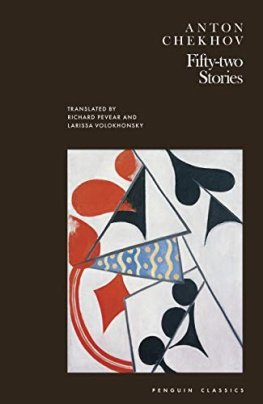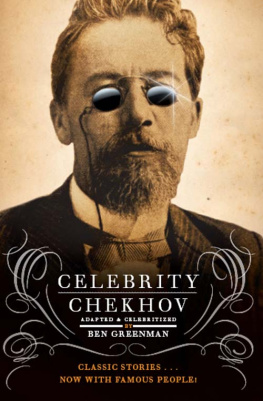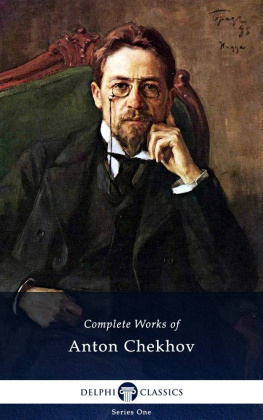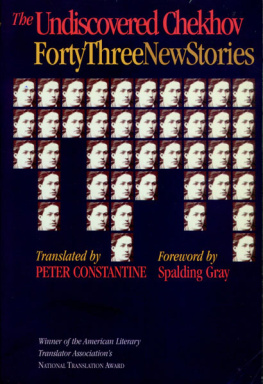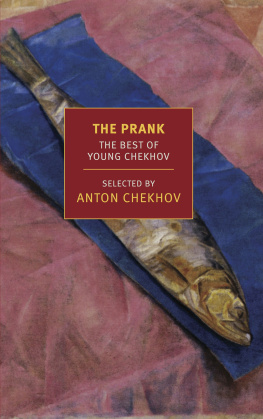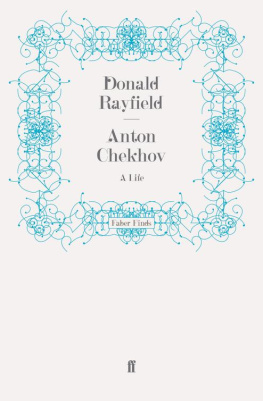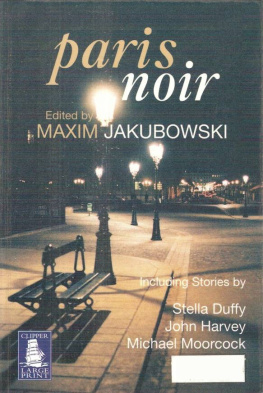MAXIM OSIPOV (b. 1963) is a Russian writer and cardiologist. In the early 1990s he was a research fellow at the University of California, San Francisco, before returning to Moscow, where he continued to practice medicine and also founded a publishing house that specialized in medical, musical, and theological texts. In 2005, while working at a local hospital in Tarusa, a small town ninety miles from Moscow, Osipov established a charitable foundation to ensure the hospitals survival. Since 2007, he has published short stories, novellas, essays, and plays, and has won a number of literary prizes for his fiction. He has published five collections of prose, and his plays have been staged all across Russia. Osipovs writings have been translated into more than a dozen languages. He lives in Tarusa.
BORIS DRALYUK is the executive editor of the Los Angeles Review of Books. His recent translations include Isaac Babels Red Cavalry and Odessa Stories and Mikhail Zoshchenkos Sentimental Tales. He is the editor of 1917: Stories and Poems from the Russian Revolution and co-editor of The Penguin Book of Russian Poetry and Lev Ozerovs Portraits Without Frames (published by NYRB Classics).
ALEX FLEMING is a translator of Swedish and Russian literature and childrens fiction. Her previous translations include works by Therse Sderlind and Cilla Naumann, and in 2015 she was awarded the British Centre for Literary Translations Emerging Translator Mentorship for Russian. She is based in London.
ANNE MARIE JACKSON has lived for extended periods in Russia and Moldova. She is a co-translator, with Robert Chandler and Rose France of Tolstoy, Rasputin, Others, and Me: The Best of Teffi, and with Robert Chandler, Elizabeth Chandler, and Irina Steinberg of Memories: From Moscow to the Black Sea (both published by NYRB Classics). Her previous translations include works by Alexei Nikitin and Olga Slavnikova.
SVETLANA ALEXIEVICH is a Belarusian journalist, writer, and historian. The daughter of two teachers, she studied journalism at the Belarusian State University in Minsk and went on to work as a teacher and newspaper journalist. She published her first book, The Unwomanly Face of War, an oral history of womens experiences in World War II, in 1985, and since then has released five chronicles of Soviet and post-Soviet history, including Boys in Zinc (1991) and Voices from Chernobyl (1997). In 2015, she was awarded the Nobel Prize in Literature, the first time it had been given to a journalist.
ROCK, PAPER, SCISSORS
and Other Stories
MAXIM OSIPOV
Translated from the Russian by
BORIS DRALYUK, ALEX FLEMING,
and ANNE MARIE JACKSON
Edited by
BORIS DRALYUK
Preface by
SVETLANA ALEXIEVICH
NEW YORK REVIEW BOOKS

New York
THIS IS A NEW YORK REVIEW BOOK
PUBLISHED BY THE NEW YORK REVIEW OF BOOKS
435 Hudson Street, New York, NY 10014
www.nyrb.com
Original Russian texts copyright 2019 by Maxim Osipov
English translations copyright 2019 by Boris Dralyuk except: The Cry of the Domestic Fowl, Rock, Paper, Scissors, Polish Friend, The Mill, On the Banks of the Spree copyright 2019 by Alex Fleming; Moscow-Petrozavodsk, The Waves of the Sea copyright 2019 by Anne Marie Jackson; After Eternity copyright 2019 by Boris Dralyuk and Anne Marie Jackson
Preface copyright 2019 by Svetlana Alexievich
All rights reserved.
Cover image: Guillaume Apollinaire, Still Life, c. 1900; HIP / Art Resource, NY
Cover design: Katy Homans
Several stories first appeared in the following publications: Moscow-Petrozavodsk, translated by Anne Marie Jackson, The White Review Online (September 2012); Rock, Paper, Scissors (excerpt), translated by Alex Fleming, Image, no. 92 (2016); The Mill, translated by Alex Fleming, Asymptote (January 2018); Objects in Mirror, translated by Boris Dralyuk, Granta Online (February 2019)
Library of Congress Cataloging-in-Publication Data
Names: Osipov, Maksim, author. | Dralyuk, Boris, editor, translator. | Fleming, Alexandra, translator. | Jackson, Anne Marie, translator.
Title: Rock, paper, scissors and other stories / by Maxim Osipov ; edited by Boris Dralyuk ; translated by Boris Dralyuk, Alexandra Fleming and Anne
Marie Jackson ; introduction by Svetlana Alexievich.
Description: New York : New York Review Books, 2019. | Series: New York Review books classics | Includes bibliographical references.
Identifiers: LCCN 2018036766 (print) | LCCN 2018046038 (ebook) | ISBN 9781681373331 (epub) | ISBN 9781681373324 (alk. paper)
Subjects: | LCGFT: Short stories.
Classification: LCC PG3492.87.S553 (ebook) | LCC PG3492.87.S553 A2 2019 (print) | DDC 891.73/5dc23
LC record available at https://lccn.loc.gov/2018036766
ISBN 978-1-68137-333-1
v1.0
For a complete list of titles, visit www.nyrb.com or write to:
Catalog Requests, NYRB, 435 Hudson Street, New York, NY 10014
CONTENTS
PREFACE
I LOVE Maxim Osipovs prose. I started rereading his stories and caught myself thinking that his prose now reads like something of a diagnosis: an accurate, unforgiving diagnosis of Russian life. Although the author is filled with love for a simple, human existence, he is simultaneously struck by how little this existence actually coincides with his own expectations. The drama of those raised by culture, raised by books. Culture normally protects us diligently from reality, but here it is hardly able to do so, because Osipov is a writer with a double vision: First, he is a doctora cardiologista profession directly related to time, to the impermanence of man; the heart is nothing more than time. And second, when you live in the provinces, its harder for culture to deceive you, harder for it to mask reality with fashionable ideas and superstitionsthat of the Russian world, for example. Out in the provinces, everything is in full view, more exposedboth human nature and the times beyond the window. And thats why the author isnt moved by the sight of the oh-so-familiar peasant when he sees him running naked through the streets, chasing his mother with an ax, a crucifix dangling from his neck. In another story, one of his characters (a policeman) explains to a writera nave man, as he sees itthat murderers are just your average people. These stories tell of people who havent come to understand the meaning of their existencewhat is it all for? Very few of us have, it must be said. The soul is forced to toil night and day. But who has the strength? The author relates to his characters as to patients; he asks them where it hurts and whether... in general, does it hurt in the soul? The Russian soulyet another myth. In reality, there is but one soul; the real question is: Is there a person?
Russia as a country has overextended itself across an enormous territory, and it lives as though time had stopped. And any attempt to speed up timethe October Revolution, for examplehas ended in bloodshed. When you delve into Osipovs texts you see that they are deceptively simple, just like Shalamovs: Behind this childish ordinariness there lies a hidden chasm. The whole time they leave you thinking how difficult it is to love humanitywonderful, repulsive, and terrifying as it isbut in order to stay human, thats exactly what you must do: You must love man. Your soul is restlessit is thinking. To inspire such thoughtsthats something that only true literature can do.

